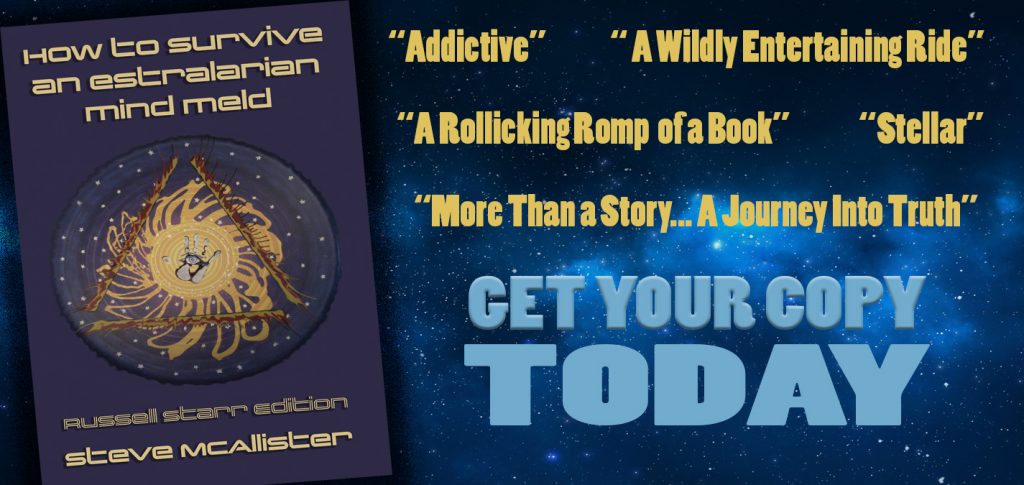
“Good morning, gentlemen. Welcome to First Watch. My name is Molly, and I’ll be your server today. May I get you something to drink?”
We each ordered a beverage and attended to the menus in our hands.
“Before we order,” he started, “I’m kind of curious. What inspired you to write a book about marketing?”
“It just kind of came to me.”
“What did?”
“The idea. I guess I’m just lucky.”
“They say that luck is when preparedness meets opportunity.”
“Do they?”
“They do.” He looked at me more intensely. “So are you?”
“Am I what?”
“Prepared for the opportunity.”
“I think so. I think this is going to be a bit of on the job training.”
“Fair enough,” he said as he shrugged and looked to his menu. “The omelets are delicious here.”
I looked at my own menu, not only considering what to eat, but also wondering what questions to ask. I looked around me at the other people in the restaurant. None of them were glowing, which was a huge relief, and I wasn’t being sucked into anyone’s mind. However, there was a still a sense that made me very uneasy.
Perhaps it was a remnant of the shame I had experienced through the people in the park, but I was struck with an overwhelming feeling of guilt. It was as if I didn’t deserve to be here, like I wasn’t worthy of the kindness I was being shown.
David folded his hands in front of him and awaited my first question.
“Still a little shook up?” he asked.
“I guess so.”
“Hmmm. Perhaps I should ask you another question to get the ball rolling,” he suggested.
“Sure. Go ahead.”
“Do you have any hesitations about writing a book about marketing?”
“Other than the fact that I don’t know what I’m talking about?”
“Yeah. Other than that.”
My energy still felt low, and I was finding it impossible to find many positive points about anything. “Well,” I began, “I guess I’m a little leery of business in America.”
“Why is that?”
“You have to admit that Corporate America has taken everything over. Business in America anymore is just this machine that devours everything that it touches.”
“Really?” David said.
“Yeah. I mean, how many small businesses have gone out of business because some huge mega mart came to town offering cheap merchandise and one stop shopping? And these are the places we get all of our stuff from now, these huge corporations that get their merchandise from overseas so that no American jobs are created
except for the cashiers and stock boys that get poverty wages and no insurance benefits.”
“Sounds like a pretty bleak situation.”
“Ya think?” I retorted. “Not only that, but the people that do put together these products overseas are forced to work under deplorable conditions for substandard wages. It’s inhuman. It’s unconscionable.”
Though I heard the words coming out of my mouth, I was powerless to stop them from spewing from my lips. All I could see of business in America was its guilt.
“I see,” said David. “Would you say that’s the consensus for American business?”
`’It seems like it sometimes. I mean, if you go to any town in America, you see the same buildings, the same signs, the same logos, the same images. We’ve been corporatized. It just makes me sick sometimes that we’ve given ourselves over to that.
“You know,” I continued, “corporations now are legal citizens. But because they can supposedly offer more to the economic stability of the government, they’re getting all of the breaks while regular people are getting left out in the cold. It just seems sometimes like the world is run by and for businesses more than people.”
“Sure does seem that way sometimes,” David said.
“And the clincher is that the business as an entity doesn’t care.”
“Doesn’t care about what?”
“Anything,” I said. “Beyond the bottom line, the corporation doesn’t seem to have any devotion whatsoever. It’s a completely Darwinian entity, only looking out for its own survival.”
“How do you mean?”
“Well, look at the airline industries. After 9/11, they got billions of dollars in bail out money from the United States government which they used to buy more airplanes from other countries.”
“So they obviously don’t have any patriotic loyalty. What else?”
“What about the automotive industry?”
“What about them?”
“Regardless of whatever excuse they want to give us, the technology does exist for us to run cars completely off of electricity. They’ve built them. They’ve been on the road. We could completely do away with the internal combustion engine and our dependence on oil while having less of a negative impact on the planet.”
“Are you saying it’s a conspiracy?” he asked.
“There’s no conspiracy to it,” I said. “It’s just business. The internal combustion engine has more replaceable parts which means more profits. And unfortunately, the automotive industry and the oil industry have grown a very symbiotic relationship, one that’s not going to be severed easily, especially when there’s still money to be made.”
“Hmm?” David thought for a moment. “What else?”
“How about the food industry. Do you realize how much garbage we put into our systems every day because it’s cheap?”
“And this is all the fault of businesses?”
“No. It’s not all their fault. But businesses are the suppliers, you know. Consumers are going to buy what’s readily available to them. I just wish businesses would give a little more thought into what they’re offering and why.”
“But businesses don’t think,” David said.
I stopped and looked at him. “Huh?”
“Businesses don’t think. They may be legal citizens, but they aren’t cognitive beings. They’re just machines. They do whatever the programmers tell them to do. And the programmers are people.”
“I know. It just seems like business in America is only about the almighty dollar. You know? I mean, we’re raping the planet, using as few environmental guidelines as we can get away with to make our profit margins as big as we can. And while we have the technology to do better and have less of an impact, the profit margins just aren’t there so we keep things status quo.
“And if it’s not bad enough that we’re destroying the planet, we’re just as diligent about destroying our own bodies. You look through a magazine or watch television and you’re just slammed with all of these advertisements for drugs, junk food, fast food, and energy drinks loaded with caffeine and sugar. Then, even when they do offer you stuff that they say is good for you, it turns out that it’s loaded with
high fructose corn syrup or some crap like that, and it’s not good for you after all. It’s insidious!”
“Wow. That is bleak.”
“Bleak? That’s not even the half of it. Most Americans know all about this stuff and they just shrug and go on about their business like there’s nothing they can do about it.”
“What can they do about it?” he asked.
“Huh?”
“You seem to be just as angry at consumers as you are at corporations. What can consumers do about irresponsible corporate practices?”
“I don’t know. They can boycott them.”
“What if they need what they offer?”
“They can find companies with better practices.”
“Do they exist? You make it seem like everyone who goes into business is out to destroy the environment, humiliate mankind, and poison everyone.”
“It seems that way sometimes,” I said. “Like Dr. Evil owns more than just Starbucks.”
“But do you really think it’s that way?”
“Sorry for the wait, gentlemen,” said Molly, placing our drinks in front of us. “Are you ready to order?”
This is an excerpt from How to Survive an Estralarian Mind Meld. Come back weekly for the next part or order your copy in ebook or paperback today!


